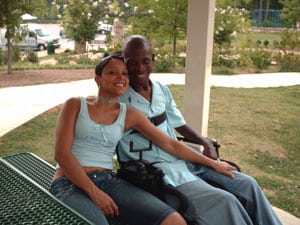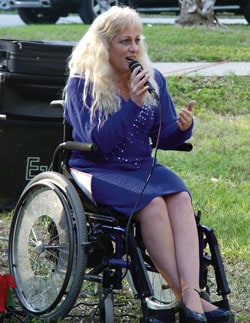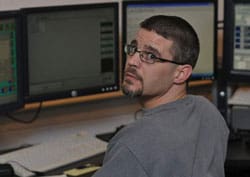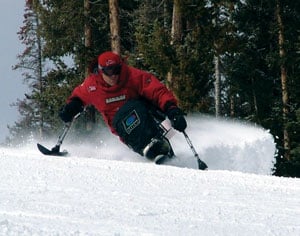
Tired of your job? Your town? Your life? Ever think of chucking it all, packing up and moving to more exciting environs — physically, psychologically, emotionally, professionally?
Bold moves are often a response to restlessness or an inner need for a more satisfactory situation — less stress or a more challenging or purposeful job or life, or a need to break loose from routines or loneliness. Bold moves have driven people to cross oceans, move west, risk failure to build something new, seek better lives, become different and better people. Here’s how some modern day pioneers — crip versions of the New American Experience — found the courage and the means to quell the discontent and embark on their own personal makeovers.
In 2005 John Mason felt compelled to commemorate his 20 years on wheels. Injured in 1985 at age 18 in a diving accident that resulted in C4-5 quadriplegia, he’d recently hit a roadblock with his transportation business, shuttling people to work, airports and special events, and needed a break from its stress and difficulties to evaluate what to do next.
“Twenty years is a long time, and I wanted a spiritual challenge,” Mason says. “I also wanted to go to a warm-weather place, so I began looking at Jamaica, Belize, the Dominican Republic and Brazil. Because I’d always had a fascination with it, I decided on Brazil.”

Mason talked a friend into going with him and headed out in April 2006. He liked everything he saw there: the people, the pace, the lifestyle, and says he began thinking, “I could live here for a while.” Once back in Atlanta, the thought of moving to Brazil continued to knock around in his head until, after talking it over with friends and family and listening to his heart, he decided to do it.
“Once I made that decision, I realized I needed to begin planning,” Mason recalls. “Through Orkut, the Brazilian MySpace, I began meeting people and making friends online. My whole plan was to connect with people, find a place to live, set up my care, and find out about nurses, hospitals, transportation and such.” Mason managed to accomplish all that, along with something entirely unexpected: In early August 2006 he found Estela. The two began communicating daily, fell in love and within months were discussing marriage.
“A lot of people thought I was crazy,” Mason says with a laugh, “but there was something about Estela. She was the person I’d written poetry about, the person of my dreams. I prayed on it and felt God was telling me I could trust it. I’m a 41-year-old man and I knew this was right. In the end, I felt very comfortable going there.”
Skeptics, cynics and non-romantics might ask, “Have you ever received one of those e-mails from Africa saying you just inherited $4 million and now you just need to send three grand to expedite the process? Have you never read those horror stories of people going to a foreign country in the name of love? They usually turn out very badly.”
Sidewalk shrinks might say, “Do the math — late 30s, business difficulties, needing adventure — classic midlife crisis.”
Mason says he read the e-mails, heard the stories, considered the pop psychology angle … and decided to go anyway.
“If this was a midlife crisis,” laughs Mason, “I dealt with it by taking a journey for love and challenging myself to get closer to God, not by getting a red convertible.” In mid-January 2007, he and his Atlanta friend headed for Rio once again.
Estela took a one-hour flight from her home in Brasilia, the country’s capital, to meet Mason, and returned to Rio to see him again the following weekend. Meanwhile, Mason and his friend lived in hectic Copacabana for two months, where he received care from two nursing assistants. Estela moved to Rio permanently in February and began providing Mason’s care while they lived near the beach, and later in Barra da Tijuca, a Rio suburb.
Then he tackled the laborious and seemingly endless procedures and paperwork necessary to marry Estela and legally move with her children to Atlanta. He was prepared to stay as long as the procedures and paperwork took, confident his annuity income from a modest settlement from his accident would cover expenses.
“Things went very slowly,” Mason recalls. “It took 30 days just to get an ID.” He attributed the delays to a combination of relaxed Brazilian lifestyle and rampant corruption. “I also needed documents from the U.S. in order to get married in Brazil. I could only stay 90 days on a tourist visa.”
In April, just days under his visa deadline, Mason and Estela were married in Brasilia, Estela’s hometown, which gave him legal residency and time to fully experience life in a different country and culture while the wheels of immigration slowly turned.
He found accessibility decades behind U.S. standards, with elevators too small, doorways too narrow, apartment bathrooms inaccessible to power chairs, and sidewalks with only random curb cuts. Initially, public transportation resembled the United States in the 1970s, leaving cabs and a manual chair his sole option. The summer of 2007 saw the introduction of public transportation for power chair users in the form of a raised roof SUV with a rear lift.
To deal with the language barrier, Mason spent time in an open-air market where he met people daily. One was a man who knew a bit of English, and the two spent time each day teaching each other their language and sharing the intricacies of their respective cultures.
“We felt our lives were on hold until the legal and immigration process was completed. After a year or so, Estela and I were growing impatient to begin our new life in the States, but the process actually worked to our benefit because when it came time to get visas, it showed we were truly serious about our relationship. I originally figured I’d be living in Brazil between six and nine months, but instead I was there for 18 months before we were able to finally leave.”
Now in Atlanta about a year, Mason reports no regrets and an abundance of smiles. The kids are enjoying their schools, Estela is making plans to attend college in the fall, and Mason is returning to consulting and public speaking. He’s also working as a medical device distributor as well as writing a book about his adventure, although the entire thing sounds more like the stuff of TV or Hollywood.
‘No Point in Regrets’

If you think going from Atlanta to Rio was a bold move, try Paris to Iowa, or from vice president of your own company to mid-management of a giant corporation. The latter two are Vincent Dureau’s stories of curiosity and his need to be challenged.
In the mid-1980s, several years after rehab, Dureau, a C6 quad, was writing software for a consumer electronics firm in his native Paris when he was faced with a decision. The company was moving his division to the United States; he could move with it or face unemployment.
“I was too lazy to look for another job, so I took the transfer,” he says. “But as the time approached, I began to panic about practical issues. I was still using a nurse for my bowel program. I couldn’t picture trying to find someone in the States, so I learned how to do it myself. I see a pattern in my life of using outside circumstances to force me to do new things. I used the move to become more independent.”
Beneath what Dureau calls “laziness” was the recognition that any future he had in his field lay in the States. He also admits to a personal curiosity regarding living in a different country.
Dureau came with 11 colleagues. Together they spent the first month in Los Angeles, which he says felt something like summer camp. From there, he went to Des Moines, Iowa, with three others for several months before returning to the City of Angels.
“Despite all my apprehensions about leaving France, it wasn’t hard. I wasn’t like the Pilgrims, who knew they would never return to England or never see their friends and relatives again. I knew I could always go back to France. Visits were only a 12-hour plane ride away. There were vacations, and of course, the telephone. It broadened my horizons to discover that not everyone lived in wealthy, all white, Catholic neighborhoods and spoke French.”
Six years later Dureau co-founded Open TV, a digital interactive pay television service providing Internet access and digital video recording capacity. As the firm’s vice president, he spent his time traveling the globe selling its wares. When home in Silicon Valley, he focused on software for the 400-plus employee firm, overseeing patent strategies and dealing with the FCC. He relished the travel, finding it both relaxing and a great way to meet people, and was living a comfortable life. But after a dozen-plus years, it became a little too comfortable.
“Being one of the founders, no one ever really challenged or pushed me, especially because I was one of the few software people in an essentially hardware company. It was a very non-threatening environment.
“I’d always wondered what it would be like to just be in the middle, to be average and feel pushed or pressured. In school I was always at the top of my class. It was the same at Open TV: comfortable, but at the end of the day just not challenging enough.”
He was 46, very successful by most anyone’s standards, recently married and living a comfortable life. He could have stayed with his company as long as he wished. He could have retired. Instead he chose to seek new challenges and find out what “being in the middle” felt like. Feeling he was running out of time to “do something big” before he retired, he went looking for new adventures at Google.
“Silicon Valley is a small community. It’s one thing to do well there in a small start-up company; I wanted to see how I could do in a large, established company with a very high bar for success. There’s a lot of institutional pressure at Google, pushing and challenging people to excel. It’s difficult to feel comfortable.
“They were looking into a TV division. I interviewed and was offered a job, which I took. They had made little effort in TV, and there was no reason to think such an effort would succeed.”
Now, having been with Google for two-and-a-half years as head of TV technology, is he feeling comfortable with his decision and performance?
“I can’t say that I am. It’s a very competitive atmosphere. Most people here aren’t comfortable, and I feel just average. I enjoy working with smart people and feel very challenged. But I see all those as positives and upsides. Sometimes I miss the comfort of the other company, but this new experience is worth it. No point in regrets.”
To see Dureau on YouTube, type in Danjunet.
Move Forward, Smooth Your Own Path
Angel Watson was in her early 30s with four years of experience being a para, living on campus and about to graduate from college. She knew she had to make some changes — she would have to move out of student housing and find a job. But she wanted to do it in more user-friendly environs than York, Pa., with its hills, winters and cobblestone streets. Rather than curiosity or need of challenge, her drive was the need for accessibility. She began by asking: “Where do the old people go?”
“Seniors want flat, accessible and warm,” Watson explains, “so they go to California, Arizona or Florida. And that combination usually means accessible jobs. York might be accessible in 10 years, but I needed accessibility now. So I decided on Florida because I had an aunt and uncle there.”

After scoping out St. Petersburg for housing and employment possibilities, Watson began planning her move. Five weeks before departure, she got news that would cause most to reconsider — she was pregnant.
“That didn’t change my thinking at all. Actually, I was glad I was going somewhere flat and warm, where the pushing would be easier. A long-term relationship with the father wasn’t what I wanted, so I just went forward. Looking back, I guess it was a bold move.”
Indeed. She left facing the daunting task of raising a child alone as a working mom, virtually no emotional support system, no visible means of support, jobless. It got bumpy.
Ever industrious, soon Watson was holding down two part-time jobs and continuing to interview for full-time positions that would use her degree. When the offer came, she began working as case manager for an organization serving people with disabilities, only to get derailed a couple months later, when at eight months into her pregnancy and a week before Christmas, she was laid off due to government cutbacks. Sixteen years later, she’s still overwhelmed with emotion when talking about it.
“It was very scary,” she recalls tearfully. “I went into hypertension, the baby went into fetal stress. Gloria was born two days later by Caesarian. My sister came from Tennessee to help for a few days, but I went home alone, to bed with a breastfeeding baby, no personal care, a catheter, stitches from the Caesarian and my wheelchair left out of reach. Thank God one of the church band members called. I reached out for help and made it through somehow.”
But she had no job and only a fledgling support system. While in the hospital, a local paper ran a piece along the lines of “Single Mom in Wheelchair Gives Birth.” A local CIL, Caring and Sharing Center for Independent Living, saw it, called, and based on her degree and experience, offered Watson a job as its ADA coordinator.
“I worked there for 18 months before getting laid off. Then I worked as an executive secretary, a church office manager and a legal assistant before going back to CASCIL as the accessibility coordinator.
“For me, coming here was most definitely worth it. My advice? Think it through, talk to others, do your research and then go for it. Life happens and some roads will be bumpy roads, but don’t burn your bridges and don’t be afraid of the bumps — smooth your own path.”
‘Most Fears are Unwarranted’
Joel Lorentz wasn’t looking to celebrate, satisfy curiosity, find new challenges or accessibility. He needed less stress and a better place to live. At 34, this T12 para had been a police dispatch supervisor in Fort Scott, Kan., for nearly six years. The 12-hour shifts had him feeling overworked, underpaid and totally stressed out. The supervising left him with too many administrative duties and procedural issues he wanted to change but knew he never could. He was burned out. The shift work isolated him socially, meaning most of his friends were cops, but many of them had left the force, either because they were pushed out or were off to greener or different pastures. He felt the department heading in the wrong direction and the town attracting a lower class of people. Both were getting him down. He needed to get out.
“The bottom line was I felt stuck in a ditch, trapped,” he recalls. “But I had all these questions. Could I sell my house? Could I find another job? Where would I live? Could I deal with living in a city? In the end, I spent the last six months ready to go.”
Despite this litany of discontent, it took him over a year to make a move. What held him back? The same thing that holds most of us back. Fear of change.

He began looking for work in the Kansas City area 100-plus miles north, where several friends had gone, eventually taking a job in Lawrence with the Kansas University office of public safety, which is responsible for student, faculty, and visitors’ safety on campus. Lorentz is a dispatcher for the KU police and also dispatches the city’s medical and fire departments onto campus when needed.
Despite an overall population in excess of 120,000, Kansas City had very little accessible housing, so Lorentz rented for a year there, a hedge against the job or his adjustment to living in a bigger city not working out. Once he was sure, he purchased what he calls “the perfect house” with everything he wanted. Does that mean things are working out?
“Definitely,” Lorentz says. “No question, this move has been good for me. I’m just in the trenches, doing straight dispatching without the supervising stresses.
“I’m making more money, with better benefits and more opportunities. I just feel much better about my life, like I’ve moved up a rung. My only regret is not doing this sooner.”
Which brings Lorentz back to fear and feeling philosophical. “I’ve been disabled for 14 years and I’ve found that almost all my fears have been unwarranted. At first I was afraid of driving, then of living on my own. I was afraid of flying, of buying a house, of finding a job and working full time. My first reaction is often, ‘I need help with this.’ I forget that being disabled has made me more able to adapt and overcome. I forget to simply trust myself, that I’m able to do more than I think I can.”
So, just do it anyway, even if you’re scared?
“Once you make yourself do something, you find most of your fears are unwarranted and that change is always an option. It’s healthy and reinforces our self-esteem. So yeah, just do it.”
The Whisper of ‘More’
In the summer of 1990, two years after he broke his back in a diving accident, Matt Feeney was 27, living in Denver and trading mutual funds in the financial industry. His life was right on track.
“My goal had always been to go to college,” he says. “Get a degree, get a good job, make a lot of money, get married, have kids, raise a family — live the American Dream.”
Then came a chance to go to a five-week ski race camp in New Zealand. He got a leave of absence from his job and headed down under.
“That trip was an epiphany for me. In New Zealand I saw a whole different attitude about life, a whole different lifestyle, without the urgency to make money … and I liked it. I came back and asked for a six-month leave to spend the winter skiing.”

Maybe he wasn’t on the right course after all. His boss turned him down but offered to rehire him if he quit, so Feeney packed his bags and moved to Winter Park, Colo., with a few sponsors to pay the rent. He tried ski racing, but decided the circuit wasn’t for him, so he took a job as a ski instructor with the National Sports Center for the Disabled and tried off-road chair racing during the summers.
“I had been making $30,000 a year (good money in 1988) at a job I loved, but felt I was in something of a rut. I traded it for a $7-an-hour, six-month-a-year job. I knew I was never going to make a lot of money, but it’s about quality of life and an enjoyable lifestyle. I felt called to the outdoors, and it has just sort of evolved over the years.” A bold move in the name of freedom and life satisfaction.
At NSCD Feeney received numerous inquiries about different adaptive programs, as people knew he was doing more than skiing. He began to see just how fragmented and segmented adaptive sports programs were, each with a specific and special focus, none offering the full range of possibilities. People were left on their own to find what they needed.
“The programs didn’t talk to each other because of fierce competition between them for money, sponsors and participants.”
And the outdoor calling kept whispering “more.”
He saw an opportunity for a referral service and a multifaceted adaptive sports program, realizing the program would allow him to do whatever he wanted. With encouragement from friends, he filed papers for nonprofit status in 1999 and began raising money for Adaptive Adventures, a program to “promote and provide sports and recreational opportunities to improve the quality of life for children and adults with physical disabilities.”
He stayed with NSCD until 2002, when Adaptive Adventures was stable enough to take him on full time. Since then the organization has grown into what he envisioned, with programs for every need: year-round sports camps and clinics for kids, a wide variety of adaptive water sports, a wide range of cycling rides, clinics, and youth camps, education and outreach programs, an information resource center, a full-range winter sports program and an armed forces program.
“I get to go everywhere, meet great people and live a low-stress lifestyle I enjoy. I see others in the industry now collaborating, and I know we helped create that. We focus on what people demand and what we’re interested in.
“I’ve always been resourceful and felt I had something to fall back on in the financial world, but I think this field picked me. What I did might not work for everyone, but my advice would be to not allow the pressure of money to distort your view of happiness. There’s a lot more to life than money.”
The rationales behind these bold moves vary wildly — celebration of 20 years on wheels, with an unexpected twist of love; ambition, curiosity and an unquenchable thirst for personal challenge; a huge gamble searching for a pragmatic place to live; desire for relief from stress and burnout at the cost of overcoming fear; a call to a different kind of freedom, happiness and lifestyle. Yet the outcomes were all quite similar — each person benefited from major personal growth, more physical, psychological or emotional independence, and greater integration of their goals and desires.
And like Vincent Dureau says, no regrets.
Support New MobilityWait! Before you wander off to other parts of the internet, please consider supporting New Mobility. For more than three decades, New Mobility has published groundbreaking content for active wheelchair users. We share practical advice from wheelchair users across the country, review life-changing technology and demand equity in healthcare, travel and all facets of life. But none of this is cheap, easy or profitable. Your support helps us give wheelchair users the resources to build a fulfilling life. |


Recent Comments
Bill on LapStacker Relaunches Wheelchair Carrying System
Phillip Gossett on Functional Fitness: How To Make Your Transfers Easier
Kevin Hoy on TiLite Releases Its First Carbon Fiber Wheelchair